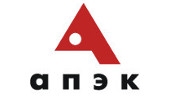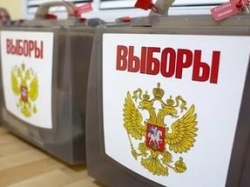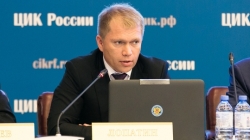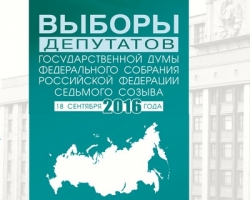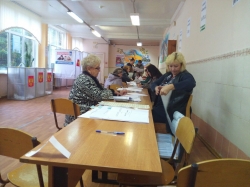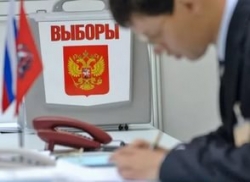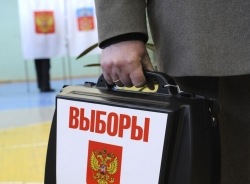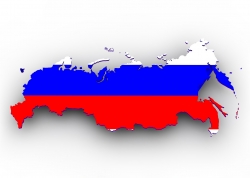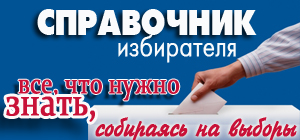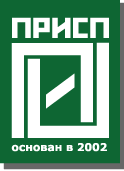The statement on the results of the monitoring activity at the regional and municipal elections which were held in the regions of the Russian Federation on 13 March 2011
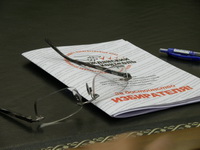
The Association of Nonprofit Organizations on Protection of Voting Rights
Mironovskaya St., 38
Moscow
RUSSIAN FEDERATION
105187
Tel: +7(495)918-34-30, +7(495)918-34-30
Website: www.civil-control.org, www.vybor-naroda.org
The statement on the results of the monitoring activity at the regional and municipal elections which were held in the regions of the Russian Federation
on 13 March 2011
Moscow, 15 March 2011
The elections of the deputies for the legislative (representative) bodies of state power of 12 regions of the Russian Federation: the Republics of Adygea, Dagestan, Komi; the Kaliningrad, Kirov, Kursk, Nizhny Novgorod, Orenburg, Tambov and Tver regions; the Chukotka and Khanty-Mansi Autonomous Districts; and the elections of the deputies for the representative bodies of 10 administrative centers of the Russian regions: Petrozavodsk, Syktyvkar, Perm, Stavropol, Vladimir, Kaliningrad, Kemerovo, Oryol, Saratov, Khanty-Mansiysk were held on the 13th of March 2011 within the bounds of the Single Election Day.
The mixed member proportional representation is used at the elections of the deputies for the legislative (representative) bodies of power in 11 of 12 regions of the Russian Federation. This voting system concerns that the number of deputies elected by the proportional representation in the single constituency and by the plurality voting system in the single- or multi-seat electoral districts is equal or differs by a mandate (the Kursk and Orenburg regions, the Khanty-Mansi Autonomous District). The proportional representation is used in the Republic of Dagestan.
The voting system which is used in the Khanty-Mansi Autonomous District—Yugra is unique: 18 of 35 deputies of the Duma are elected in the single constituency by party lists, 14 deputies are elected in the single-seat electoral districts and 3 deputies are elected in the multi-seat electoral district which is the whole territory of the autonomous district. This multi-seat electoral district was formed in order to provide the representation of indigenous scanty people of the North – traditionally that’s they who take part in the elections as candidates in this region. Thereby, the electorate votes at these elections by three ballot papers.
The voting system of the Chukotka Autonomous District is also interesting. There 6 deputies of the Duma are elected by the proportional representation and 6 deputies are elected by two three-seat electoral districts: the 1st East and the 2nd West (the reason for the cutting of two okrugs is impossibility to observe the requirements of the legislation on the approximate equality of the districts and the accountability of the borders of administrative and territorial formations).
The common number of replaceable mandates in the result of these elections is 547; the quantity of the representative bodies varies from 12 deputies in the Chukotka Autonomous District to 90 in the Republic of Dagestan.
The 7%-limiting election threshold was set in 10 of 12 regions of Russia; it’s 6% in the Kirov region and 5% in the Chukotka Autonomous District. The terms of office of 11 regional parliaments are 5 years, and 4 years for the Council of State of the Republic of Komi.
Assessment for the state of the election campaign stages
1. Nomination and registration of candidates and lists of candidates
It’s curious that not all of the registered political parties took part in the nomination of the lists of candidates in the regions. The number of the nominated lists varies from 6 in Dagestan, the Kaliningrad and Kursk regions, 5 in Adygea and Komi, in the Kirov, Orenburg and Tambov regions and in the Khanty-Mansi Autonomous District—Yugra, to 4 in the Nizhny Novgorod and Tver regions and in the Chukotka Autonomous District.
Not all of the registered political parties took part in the nomination of candidates by majoritarian constituencies in these 12 regions. Here the number of parties which have nominated their candidates varies from 6 in Adygea and the Kursk region to 2 in the Chukotka Autonomous District.
In general, on expiration of terms for nomination of candidates we can point out that the political activity of the parties and the candidates who nominated themselves has fallen insignificantly in comparison with the previous elections which were held on the 10th of October 2010. Thus, the average number of nominated lists of voters has declined from 5.5 to 5 lists in the region. The average number of candidates for a majoritarian mandate has also declined from 5.8 to 5.4 candidates for a mandate.
From the point of view of the experts of the Association, the preparations of the political parties for the federal elections including the necessity of accumulation of some certain resources is one of the reasons for such reduction.
At the same time, the average rates take into account the Chukotka Autonomous District where the political activity is traditionally not high as well as the number of voters. For the first time in this region the Communist Party of the Russian Federation (KPRF) takes an active part (it participates in the elections in this region for the first time since 2000). But 2 largest parties – the United Russia and the KPRF – could propose only 3 candidates for each of 6 single-seat electoral districts.
The “Right Cause” party became the least active party within the bounds of the election campaigns held in March. It nominated only one list of candidates in the Republic of Dagestan and nominated no candidates in majoritarian constituencies in all of 12 regions.
The regional departments of the parties explain the renunciation to nominate the candidates or the lists of candidates differently. Thus, the regional department of the Russian United Democratic Party Yabloko didn’t nominate a list of candidates in the Kirov Region due to the lack of money for the election campaign and enough quantity of candidates, said V. Makarov, the chairman of the regional department. The renunciation of the regional department of the “Right Cause” party not to participate in the elections in the Chukotka Autonomous District was explained by the confidence that the party wouldn’t overcome the limiting election threshold and at the same time they have assured that they will participate in the elections in 2016.
The regional department of the “Right Cause” party announced a renunciation of participation in municipal elections in the Saratov Region and called the regional departments of other parties to boycott the elections in common. They called it “the only effective method of political struggle in present situation”. The “Civil Control” Association supposes that the real motive for such a renunciation could be one of the following reasons (or the whole set of reasons):
1) demonstration to the authorities and community of their reluctance to participate in the election struggle keeping to the rules defined by the law;
2) the lack of organizational, pecuniary and financial resources for conducting of election campaign;
3) political techniques: willingness to attract attention of the community and mass-media and to leave the existing situation “gracefully”, “saving face”.
The regional departments of the Liberal Democratic Party of Russia (LDPR), Yabloko, the Right Cause and the Patriots of Russia took the similar position at the municipal elections in the Rostov region where they nominated no candidates. At the same time the head of the regional department of the LDPR said that the renunciation to nominate candidates was a remonstrance against the electoral system and falsification at the elections. The head of the regional department of Yabloko was less peremptory. He explained the actions of his party by “inevitability of the election results” and “the lack of subdivisions in the respective municipal areas and means for the full-fledged work”.
The “Civil Control” Association points out the tendency of so-called boycott against the elections from the part of the regional and local departments of political parties which doesn’t favour the improvement of standards of the election alternativeness. The Association calls the political parties to decline such a practice and to settle the existing conflicts using the means of civilized political struggle and in suitable cases – the ways provided by the law to defense their rights.
At the same time, the number of the State Duma deputies and other federal politicians increased in the lists at the regional elections. Thus, the United Russia nominated about 40 deputies for the Lower chamber of the Federal Assembly in the composition of regional lists. 10 of 12 regional lists of candidates (except Dagestan and the Tambov Region) nominated by the LDPR were headed by V. Zhirinovsky, the leader of the party. The Association supposes that it’s connected with the forthcoming elections in the State Duma and that makes it possible to increase the ratings at the expense of well-publicized persons on the federal level and to carry out some kind of “primaries” before the parliamentary elections in December 2011.
A large scandal happened in connection with the nomination of candidates in three-seat electoral district in the Khanty-Mansi Autonomous District—Yugra which is traditionally considered to be national and provides the representation of indigenous scanty people of the North in the Duma of the district. The regional department of a Just Russia nominated the candidates A. Filippenko (who is the person bearing the same family name of the previous governor of the Autonomous Okrug) and D. Stalin in this district.
The nomination of these candidates displeased the Association of indigenous scanty people of the North of Yugra which submitted an appeal addressed to the President of the Russian Federation, to the governor of the Autonomous District and to the chairman of a Just Russia party. The Association pointed out the necessity of adequate representation of the Khanty and Mansi people in the legislative body of the District which is extremely important for the preservation of the unique culture of the scanty people of Yugra and is of great importance for them. There was a demand to recall the candidate in these letters. In addition to this, the representatives of above-mentioned indigenous people gave numerous interviews for both regional and federal mass-media where the authors of the appeal called the nomination of these candidates of a Just Russia the manipulative plan of experts on political technologies which is intended to discredit the system of democratic elections.
The “Civil Control” Association would like to notice that the Russian legislation makes it impossible according to the international commitments of the country to demand from a candidate to state his nationality and, moreover, to restrict the right of the citizens to be a candidate in one or another district depending on their nationality. Something different would contradict the article 19 of the Russian Constitution. Therefore the Association considers that the representatives of indigenous scanty people of the North should struggle for their representation in the multi-seat electoral district using the means of agitation but not with the help of demands to remove the Stalin’s candidacy.
The Association was watching the process of registration of the candidates Stalin and Filippenko. At first, evidently under pressure from some interested parties, the election commission of the Khanty-Mansi Autonomous District refused the registration of these candidates in connection with creating of the fighting fund. In outline the process of creating a fund is the following. A candidate is nominated, then he obtains the power of attorney to the authorized representative on financial issues, sends the documents to the election commission, the election commission registers the authorized representative, after that he opens a special electoral account in the bank. However, a special electoral account addressed to Stalin and Filippenko was opened by the authorized representative before his registration in the election commission. That became the ground for the conclusion about the breach of the order of the fund creation. At the same time, according to the law of the Khanty-Mansi Autonomous District, when there is a breach of the order of the fighting fund creation (opening the account), this fund is considered to be not created. The Central Election Commission (CEC) of the Russian Federation while examining the complaint came to the conclusion that this regulation of the regional law is an additional restriction of the electoral rights of citizens in comparison with established by the Federal law and on these grounds it isn’t subjected to application, and the CEC annulled the decision about the rejection of registration. We need to point out that this position of the CEC can’t be called indisputable as it’s obvious that the additional restrictions of the rights of some subjects of electoral process are practically always the supplementary guarantees of the rights of the other subjects, and vice versa. The CEC considered that the unregistered candidate should have priority rights in this situation evidently coming from the principle that the inobservance of the formal order shouldn’t entail the restriction of the constitutional right of the citizen.
There was held a conference of the local department of the KPRF in the city Nevinnomyssk in the Stavropol Krai on the 5th of January 2011 where it was considered the issue about the nomination of candidates for the deputy positions in the Duma of Nevinnomyssk. Three representatives of the Territorial Election Commission (TEC) came to the conference. They are: O. Lyahovnenko, the chairman of the TEC, A. Kurilo and M. Pletneva, the members of the TEC. Their certificates were preliminarily checked and their personalities and authorities ascertained. Afterwards it was decided at the conference to make the members of the TEC A. Kurilo and M. Pletneva leave this meeting, at the same time the chairman of the TEC O. Lyahovnenko was given the possibility to be present at the conference. After that all the representatives of the TEC including its chairman left the conference.
The “Civil Control” Association while assessing the existing situation points out that a political party has two obligations in connection with carrying out such a conference according to the Federal law “On the political parties”: to inform the respective election commission in advance, and that was made, and to admit the representatives of the election commission to the meeting. The current legislation doesn’t regulate and consequently doesn’t limit the number of the representatives of the election commission who are allowed to visit the conference. At the same time, the indication of the word “representatives” in plural in the law assumes, according to the meaning of the law, the obligation of the political party to admit at least two representatives of the election commission to their discussion. Besides this we should take into account that the activity of the election commissions is carried out collectively, and the members of the election commissions possess equal rights. In view of this case the refusal of the local department in the right of access for all the representatives of the TEC for the conference and the limitation of the number of representatives who are allowed to visit the meeting is unfounded and doesn’t correspond the current legislation, in the opinion of the “Civil Control” experts. At the same time, the experts of the Association point out that according to the existing documents the chairman of the territorial election commission refused to assist at the conference independently, her rights and possibilities weren’t limited by the decision made at the meeting.
The process of sudden renunciations of candidates not to take part in the elections after their nomination by the parties is in progress. Thus, four candidates who made up the regional group at the elections in the State Council of the Republics of Adygea…
The effective deputy V. Kozlov was excluded from the list of candidates for the town council of Balakovo (the Saratov region) in the course of the election campaign. Before that he had won the party primaries confidently. The decision was made by the political council of the local department of the party.
There were registered the intra-party scandals during the nomination of candidates in the regional departments of a Just Russia in the Republics of Komi, in the Vladimir region and in Zvenigorod (the Moscow region). The reason for such scandals is traditionally a nomination of candidates introduced under pressure from higher party governing body, but these candidates don’t meet warm support in respective regions.
The procedure of the registration of candidates which was finished in all regions on the 9th of February 2011 is notable for sufficient loyalty of election commissions and reduction of the quantity of rejections on evidently formal grounds at the elections of the regional level. At the same time, there were observed the facts of refusals in registration at the municipal level and their validity could be called in question.
Thus, for instance, there was conducted essentially a repeated verification of the signatures of the candidate Kovalchuk at the elections for the district council in Kaliningrad. The results showed that the quantity of unauthentic and untrue signatures exceeded the acceptable value. At the same time, according to the statement of the candidate, he didn’t attend the repeated verification and was acquainted with its results over the telephone.
After the second attempt the TEC of the Frunzensky District, Vladimir, made a decision to refuse the registration of Alexander Rybakov, the current mayor of the city and the member of the political council of the United Russia in the capacity of candidate (note: he was going to take part in the elections as the person nominated himself, but not by the party list). One of the grounds for the refusal of the registration became again the problem of the stamp “Annulled” which is put down in the passport by the bodies of the Federal Migration Service which isn’t stipulated by the Regulation on the passport of a citizen of the Russian Federation. The Association had told about that in the final analytical report on the results of the elections monitoring activity on the 10th of October 2010. At the same time, according to the statements of the TEC members, such a careful check of documents wasn’t carried out in respect of the other candidates. The Association is watching over the further developments in connection with the appeal of the TEC decision.
There were declared invalid about 500 signatures of the candidate Dmitry Kushpit in Vladimir in the connection with mistakes in the information about the voters. Examining the practice on the issues of declaring the signatures invalid on these grounds, the Association considers that it’s necessary to address to the Central Election Commission of the Russian Federation an appeal to formulate criteria of the concepts “data corrections” and “mistakes in the information” with the aim of bringing the above-mentioned practice to the uniformity.
The candidates from the parliamentary parties – the KPRF, the LDPR, a Just Russia – and also Valentin Kachevan, the current head of the municipal district in Murom, the Vladimir region, were refused in registration. V. Kachevan said that there were registered three candidates, and two of them are technical. The decisions of the TEC concerning the refusal of the registration of the candidates were cancelled by the court of first instance.
During the election campaign in Oryol, A. Roslov, the headmaster of the school №30, who had been nominated by the KPRF as a candidate for the deputies of the town council, was dismissed from the office in view of the decision made by the owner of the property concerning the termination of the labour contract. Formerly there were made some attempts regarding A. Roslov to fire him on grounds of the same article of the Labour Code which were declared illicit in legal form. The Association points out that according to the judgement of the Soviet district court pronounced on the 11 February 2011 the decision concerning the discharge was admitted to be legal and the “Civil Control” proceeds to monitor the court examination.
In Kaliningrad unknown people crashed a car which belonged to R. Kozlov who was a candidate for the deputies of the Kaliningrad regional duma nominated by the KPRF.
The Association supposes that it’s necessary to check these two cases and react if there is connection between the mentioned events, the forthcoming elections and the political activity of the candidates.
Some signs of abuse of the official standing are observed in the Republic of Komi. Here the chairperson of the TEC of the Ust-Kulomsky District appealed to the public prosecutor's office according to the fact of the illegal election campaigning, involvement of the members of the administration into it and intervention in the work of the election commissions by Tatyana Litvinova, a head of the district administration bodies, in favour of Sergey Ivanushkin, an assistant head of the administration, and against Dmitry Shatohin, his competitor.
The Association notes a proceeding practice to change the party membership by some candidates shortly before the elections. Thus, in Kaliningrad Vladimir Vukolov and Alexander Shackih, who were at the head of the party “Yabloko” lists, had formed the United Russia faction in the district town council as far back as in December 2010, and before the New Year they joined the party “Yabloko”.
In Stavropol the United Russia disputes the registration of V. Tatarov in the list of the LDPR candidates for the municipal duma. Earlier he was the member of the United Russia but afterwards he left the party having registered the application concerning the leaving in the local department of the party.
In addition to this, there are cases of administrative pressure on those candidates who were nominated by the political parties. These facts were registered, for instance, in the Republic of Adygea where the pressure for the purpose of removal of the candidacies was exerted upon the candidates from the regional group №1 of the single list of candidates from the KPRF.
The signs of pressure on the candidate were observed in case of the institution of legal proceedings concerning the fact of the renting of a steading in 2001 by Gennady Gorbachev who was the candidate for the deputies in the council of state in the Republic of Komi and for the post of the Vorkuta mayor. It’s important to take into account that the event which became the ground of these legal proceedings had happened 10 years ago. The Association calls the bodies of the public prosecutor's office to inspect the validity of the mentioned actions carefully.
The elections in Beryozovsky village of the Sverdlovsk region were postponed due to the fact that only one candidate was registered. It was Yevgeny Pistsov, a candidate from the United Russia. Several candidates who nominated themselves had been refused in registration on different grounds and after that Andrei Barkeev, a candidate from the LDPR, withdrew his candidacy and announced that he felt pressure from the side of the United Russia. Such a position of the candidate from the LDPR can’t be called constructive. The Association turns the parties’ attention to the inadmissibility of the deprivation of the right of choice for the voters.
The Association would also like to notice a case in Yekaterinburg. There Dmitry Gorchakov, a candidate for the deputy position of the municipal duma, declared that he had gathered “for the purpose of security” not only the signatures of the necessary quantity (about 350), but also consents of each voter for getting his or her information from the passport which he was going to use in the handwriting expert verification. This fact confirms the necessity of adjustment and regulation of the handwriting verification mechanism by the election commissions.
In Pervouralsk, the Sverdlovsk region, Veronika Arkhipova, a candidate for the mayor position, declared about nomination of a candidate-double against her. It was Svetlana Postovalova working as a merchandiser in Yekaterinburg. V. Arkhipova supposes that the nomination of Postovalova is an element of “black PR”, as “the colour of hair and eyes, the shape of the face and the features are the same as hers”. The Association points out this unusual statement concerning techniques of using of doubles in such a form.
There were mass refusals in registration of candidates who had been nominated by the KPRF party in the Chaykovsky metropolitan region of the Perm Krai. These refusals were admitted illegal in court regarding the majority of candidates. The reason for admitting the decisions on refusals in registration illegal was that it couldn’t be the candidates’ fault that registration of documents in the TEC took longer than planned and that the department of the Savings Bank of the Russian Federation (Sberbank) was closed (due to the problems with electricity).
Problems which repeat in the course of preparation for each Single Election Day concerning identification of the party status of citizens could be observed during this election campaign, too. Thus, V. Tatarov, a candidate for the duma of Stavropol who was nominated by the LDPR had been recently a member of the United Russia and he submitted and registered a statement on leaving the party in the local department before the nomination. However, the election commission of the municipal formation denied his registration due to the membership in the other party, the election commission of the krai annulled this decision, and afterwards the krai court of Stavropol repealed the decision of the election commission of the krai. The Association supposes that it’s necessary to confirm the above-mentioned position concerning the necessity of accurate observance of the citizens’ right to leave a party freely which is realized by giving a statement to the authorized bodies of the party or its organization department. On account of the frequent disputes the Association reminds also of the initiative on the legislative regulation of the procedure concerning leaving the party.
At the same time in quite a number of cases the validity of refusals of registration is beyond doubt for the experts. Thus, in Stavropol the registration of the list of candidates from the Right Cause was denied because of the revelation of 76.4% of invalid signatures when only 10% are permissible.
There was a public event which attracted the community’s attention when six activists were chanting claims about the registration of parties and candidates in front of the entrance of the CEC. The Association regards such an action as unconstructive since it draws no juridical consequences and it isn’t directed to the legal reinstatement of disturbed (in the opinion of the participants of the event) rights of the party. According to statistics, the registration of only one of 60 nominated lists of candidates was denied. 9 of 10 lists of candidates which had been nominated by the unparliamentary parties and which had submitted the signatures of the voters were registered successfully. It is the evidence of the possibility to observe the requests of the law on the voters’ signatures. The Association draws attention to the necessity of more careful approach to the process of collecting the signatures and more accurate execution of all the requests of election legislation.
At the same time, in quite a number of cases there were registered several incidents when election commissions made baseless decisions on the registration of candidates and lists of candidates. Thus, there was cancelled in legal form the decision on registration of the list of candidates from the party “Patriots of Russia” in the Khanty-Mansi Autonomous District—Yugra. There was ascertained at the trial that the election commission had registered the mentioned list while, according to the results of the signature verification which were submitted by the regional department of the party, insufficient quantity of signatures was admitted authentic to be registered. In this situation the election commission had no grounds for registration of this list of candidates.
In Zvenigorod, the Moscow region, there was made a decision at the trial concerning the repeal of registration of S. Juravski, a candidate for the position of the mayor nominated by a Just Russia which was afterwards annulled by the Court of Appeal. The reason for the rejection of registration was using the image of the monument in the agitation materials which is (in the opinion of the authors) the infringement of the legislation on intellectual property.
At the same time the Association observes the aggression of several regional departments of the political parties regarding to their competitors. Thus, according to the statements of the United Russia there was cancelled the registration of the lists of candidates from a Just Russia and the LDPR in the Kameshkovo district, the Vladimir region. The similar demands were declared regarding to the list of candidates from the KPRF. The Association supposes that one-man-for-one-seat elections on proportional representation can’t be considered to maintain international election standards completely and should be postponed for additional nomination of lists of candidates.
In general, summing up the results of the registration of candidates and lists of candidates at the regional elections, the Association points out that no one of the political parties had shown the complete effectiveness of nomination (that means that no one of the parties had passed this stage of the election process “without loss”).
There were registered 57 of 60 nominated single lists of candidates including 9 of 10 lists nominated by the unparliamentary parties. Three lists were refused to be registered. Two of them – the regional departments of the Patriots of Russia in the Republic of Adygea and in the Kirov region – were denied to be registered because they hadn’t given the signatures of the voters and other documents for the registration. And another one is the regional department of the Yabloko party in the Tambov region – it has got refusal due to the revelation of more than 10% of invalid signatures. There were eliminated several candidates from the registered lists of 6 parties which took part in the elections. The United Russia lost 3 candidates, the KPRF – 2, the LDPR – 23, a Just Russia – 12, the Patriots of Russia – 6, the Right Cause – 2. The Yabloko party is the exception – it had two registered lists of candidates and no one was excluded. The average number of eliminated candidates from a single list of candidates is 1.35%, the number of lists which were denied to be registered according to the results of the signature verification is 1.72%.
There were provided alternative elections with the average number of candidates 4.44 for a mandate including 0.93 candidates who nominated themselves for a mandate in the result of the process of registration of candidates in the majoritarian constituencies.
The average efficiency of the nomination of candidates in the majoritarian constituencies is 82.3%. In the course of this election campaign no one of the parties could reach 100% of effectiveness for nomination of candidates. According to this indicator the parties have taken the following positions: the United Russia – 99.1%, the LDPR – 97.2%, the KPRF – 96.2%, a Just Russia – 92.2%, the Patriots of Russia – 50%, Yabloko – 9.5% and candidates who had nominated themselves – 60.5%. The regions have occupied the following positions according to the index of effectiveness: the Chukotka Autonomous District – 100%, the Nizhny Novgorod region – 89%, the Kirov region – 88.4%, the Orenburg region – 87.9%, the Republic of Komi – 82.6%, the Republic of Adygea – 81.2%, the Tambov region – 78.9%, the Tver region – 78.6%, the Khanty-Mansi Autonomous District—Yugra – 77.4%, the Kursk region – 76.1%, the Kaliningrad region – 76%. At the same time according to the index of self-nomination efficiency the regions have taken the following places: the Chukotka Autonomous District – 100%, the Republic of Adygea – 89.1%, the Kirov region – 74.6%, the Nizhny Novgorod region – 64.3%, the Orenburg region – 63.6%, the Tambov region – 58.6%, the Khanty-Mansi Autonomous District—Yugra – 57.1%, the Kaliningrad region – 38.8%, the Republic of Komi – 35%, the Kursk region – 33.3%, the Tver region – 30.4%.
The “Civil Control” Association points out the growth of the average effectiveness of nomination from 77.6% at the previous elections on the 10th of October 2010 to 82.3% at the elections which took place on the 13th of March 2011. The Association considers that the reasons for such growth are more responsible approach of the participants of the elections to the process of preparations of documents and certain liberalization of the approaches to checking of documents by election commissions.
The Association hopes that this tendency has a long nature and the elections which take place in December 2011 will get even more active participation of political parties and candidates.
The Association monitors carefully the investigation of the murder of Hadzhemos Khachetcukov, a candidate for the deputy position in the State Council (Khase) of the Republic of Adygea in the center of Maykop. The Association calls the law enforcement agencies to conduct a careful investigation of the crime and institute criminal proceedings against the guilty people.
In the course of the preparations for the Single Election Day there were observed several separately taken cases of using the advantages of official standing. Thus, Strelkov, a deputy governor of the Kursk region according to the information given by mass media sent an appeal printed on the official letterhead to the election commission of the region. In this appeal he asked to address the statement on revocation of registration of S. Vasilyev, a candidate from the KPRF, to the court. The Association considers the using of an official form in this case as an attempt to exert pressure on the election commission.
2. Election campaigning
There were spread leaflets of anti-religious trend with the KPRF symbols in Inta, the Republic of Komi. They were entitled “Commandments of militant atheists” and there were given the quotes ascribed to V. Lenin. In particular, they included such expressions as the following: “it’s necessary to put an end to religion and priests as soon as possible”, “priests must be arrested as counter-revolutionaries and saboteurs, they should be shot everywhere and mercilessly”, “churches are subjected to closure”, etc. According to the statement of the secretary of the KPRF local department the party had nothing to do with the issue of these leaflets and it addressed the statement on this case to the public prosecutor's office.
In the Tambov region the regional committee of the KPRF addressed to the public prosecutor's office concerning the leaflet “Tamara Pletneva’s Team” published on behalf of the party. A number of inept proposals, for example, on the transfer of the capital of the region from Tambov to Michurinsk could be read in this leaflet spread in the regional centre. The “Civil Control” Association points out that the publishing and distributing of leaflets like the leaflet “Tamara Pletneva’s Team” appeared in Tambov was a widely-distributed black electoral technique, and not only in Russia. The problem is that it’s a quite difficult task for the law enforcement agencies to find the publisher and the client, as such a number of printed copies are thrown into very rapidly as a rule, that is for one night the town turns to be flooded by the leaflets and after that their distribution stops. It’s very important to find the distributors promptly and with the help of them try to come into contact with organizers and publishers of the leaflets. The question is who is to profit from the distribution of the certain number of printed copies in the certain region? As these leaflets contain quite a few deliberately ridiculous proposals on behalf of the communists it will probably act in favour of their opponents at the elections.
Almost half a million of agitation leaflets “GenoTSYP” which were distributed after the nomination of lists of candidates by the above-mentioned party.
In Saratov there were distributed publications “The United Russia. Our Saratov” and newsletters “Civil Initiatives” and “We Want Changes”. The election commission checks the legality of the mentioned materials by the appeal of V. Rushkin, a deputy of the State Duma from the KPRF. In his opinion, the mentioned publications have agitation nature and they contain no output data.
In the Vladimir region there were distributed leaflets on the front doors of the buildings which contained the information that D. Kushpita, the main member of the Yabloko party in Vladimir, gave shelter to “alkies and drunkards” in stairwells. The publisher and distributor of these leaflets is also unknown.
In the Kirov region there were distributed printed materials stylized like the KPRF editions, but in fact it was fraud smearing the communists.
In Zvenigorod, the Moscow region, several people were detained in view of their distribution of the agitation publications which were banned by the election commission due to infringements of the legislation.
Thereby, the distribution of the illegal agitation publications was again typical for the elections almost in each region. The Association points out that the quantity of spurious materials, i.e. the publications distributed on behalf of the political parties and candidates without their consent, increased dramatically in the course of this election campaign. And such a spreading was being fulfilled from the very beginning of the election campaign.
The “Civil Control” Association calls the law enforcement agencies to suppress the infringements of the law in this sphere.
Besides that the Association would like to note the cases when some parties declared that there were political hidden motives in some everyday events. Thus, for instance, a Just Russia declared that there was burned a car of their member and candidate for the position of the mayor of Zvenigorod by her opponents. However, according to the inspection results, the aggrieved woman said that she was a taxi driver and had nothing to do with politics in general and with a Just Russia in particular. Moreover, she supposed that the car had been burned down due to disrepairs in electric wiring. The “Civil Control” Association considers that such actions are inadmissible.
In the course of the election campaign there were made attempts to accuse one of the parties of distribution of extremist calls under the pretence of political jokes by the means of the website.
And again there were placing of agitation materials without consent of the owners of the property which is traditional for the elections in Russia. Thus, in Kirov two agitators sticking the materials on the electric posts were detained.
The violations in the form of distribution of agitation materials containing unauthentic output data make up a large group. Thus, in Bogorodsk, the Kirov region, on the 1st of February there were detained distributing agitation materials where the date of publishing was the 2nd of February.
The agitation materials of the United Russia on the billboards in the Vladimir region were pelted with paint. In the opinion of the representatives of the party, there was exerted pressure on it on the part of the regional and town administrations.
At the beginning of the election campaign the agitation materials of the LDPR in the Kirov region contained the slogans which were regarded by the representatives of the national diasporas as stirring up the national discord. Following the interference on the part of the election commission the party ceased the distribution of these publications.
The cases of illegal keeping and distributing of agitation materials of the United Russia party were set in the premises of the children’s club “Romantic” in Kirovo-Chepetsk, the Kirov region. For all that the contract for the premises rent with a view to conduct the election campaign hadn’t been made with the children’s club and no payment was contributed.
A number of candidates use different pretexts for conducting indirect agitation by deluding the voters. Thus, Sergey Malenko who was denied to be registered as a candidate for the deputy position of the Perm municipal duma declared that he was informed when giving his statement to the court that “several dozens of appeals on his registration had already been there”. The Association observes that such a statement couldn’t correspond to the facts as according to the civil judicial legislation only a person whose rights were infringed, i.e. the candidate himself or the election association which had nominated him can contest the statement on the decision of rejection his registration in court.
The “Civil Control” Association expresses concern in connection with the statement of Valery Rushkin, a deputy of the State Duma from the KPRF: “In fact we have already bought the bats and we’ll strike the hands of those who infringe the law and rewrite reports. The bats are sold freely in the shops… We have already made up the fighting groups, and I am their first representative.” The Association considers such statements to be an outrageous political technique and declares that it’s inadmissible to use rhetoric containing the signs of preparations for infringement of the law. The statements of such kind should be undoubtedly assessed by the law enforcement agencies as one of their main duties is to suppress breaking of the law. Such calls should meet tough unacceptance of the participants of the election process. There is no doubt that we must struggle against falsifications if they occur and impose strict but provided by the law sanctions on those who organize these adulterations.
There were noted the cases of subornation of the voters in some regions. Thus, in Pervouralsk, the Sverdlovsk region, the voters were given 200 roubles for a person for supporting one of the candidates for the mayor position.
The participants of the election campaigns declared in the number of cases that there was exerted administrative pressure on the printing organizations and as the result they were refused the possibility to publish and distribute agitation materials. Thus, in the Kaliningrad region the representatives from a Just Russia and the KPRF brought such a complaint.
The calls to forcible actions were repeatedly heard in the course of the current election campaign. Besides that such actions were committed in the number of cases. Thus, Roman Gutorov, a candidate for the deputy position of the regional duma from the United Russia, the head of the “Young Guard of the United Russia” was attacked after his taking part in the action against increasing the prices on oil in Kursk.
The Association points out not a high enough level of participation of the regional and local departments of the United Russia representatives in the joint agitation activities (debates). At the same time there was an incident in the Republic of Komi when a representative of the regional department of the United Russia wasn’t admitted to the participation in the debates on the state media.
There were registered the cases of damage of the United Russia 24 banners with the help of paintball guns in Vladimir. These banners depicted the candidates who had been among the top three of the regional list of candidates. We would like to observe that these actions could be called the actions causing damage to the agitation materials and the guilty people must entail the amenability established by the law.
The distribution of spurious leaflets was registered in the Kaliningrad region (the leaflets were aimed against the Patriots of Russia party), in the Tambov region (against the KPRF), in the Nizhny Novgorod region (against the KPRF) and in the Kirov region (against the United Russia, a Just Russia and the KPRF).
The participants of the election campaign regard the broadcast of the inter-regional conference of the United Russia in Bryansk during almost 5 hours on the air of the twenty-four-hour informational channel “Russia 24” as the infringement of the current legislation. We consider that this issue should be a subject of the legal examination.
In the course of the election agitation there were used slogans and calls which contradicted the federal legislation deliberately. Thus, in the Republic of Komi there was used a slogan “Half an income to the Republic! Not to give any more to Moscow!” by a Just Russia. At the same time the Supreme Court of the Republic of Komi while examining the statement on the refusal of registration of the list of candidates put off the case and thus made it impossible to make a decision on the substance of declared demands.
The organizing of collecting the signatures for the support of nomination of S. Mironov, a leader of a Just Russia, for the chairman position of the UN is an example of using of “black techniques”.
The activists of the United Russia were attacked in Perm and as a result from 5 to 10 people were injured. And the perpetrators of the attack haven’t been found by the law enforcement agencies.
3. The Election Day and preparations for it.
The “Civil Control” Association carried out the public control of the course of the elections on the Single Election Day on 13 March 2011 in the following directions:
- the representatives of the Association worked in 16 regions and monitored the territories where the elections of different levels took place;
- the international experts in the sphere of electoral processes who had arrived in Russia on the invitation of the organization “For Democracy and the Rights of People” (a member of the “Civil Control”) visited the Republic of Komi, the Kirov, Moscow, Orenburg and Tver regions together with the members of the Council of the “Civil Control” Association. The representatives from Austria, Hungary, Germany, Italia, Latvia, Lithuania, Poland and Finland were the members of this mission;
- the analysts of the “Civil Control” Association monitored mass media, the party websites and other web-sites. The publications reflecting the conflict situations in the course of the Single Election Day (SED) were examined and systematized. The number of the publications on the conflict situations: the Republic of Adygea – 9, the Republic of Dagestan – 3, the Republic of Komi – 6, the Altai Krai – 4, the Perm Krai – 4, the Stavropol Krai – 6, the Vladimir Region – 10, the Kaliningrad region
– 15, the Kemerovo region – 3, the Kirov region – 12, the Kursk region – 11, the Leningrad region – 1, the Moscow region – 1, the Nizhny Novgorod region – 8, the Novosibirsk region – 21, the Orenburg region – 5, the Pskov region – 2, the Saratov region – 26, the Sverdlovsk region – 8, the Tambov region – 3, the Tver region – 6, the Chelyabinsk region – 4, the Khanty-Mansi Autonomous District—Yugra – 3, the Chukotka Autonomous District – 2, Saint Petersburg – 13;
- special attention was attended to the work with the SMS-portal “Truth Code”. There were received 268 messages during the work of this portal. The absolute majority of the callers complained of the breaches of the election procedures (illegal agitation, violations connected with the lists of candidates, subornation of voters, etc.). Owning to the fact that the messages received by the “Truth Code” had a telephone number of the sender, the representatives working on the hot line called them back in the number of cases and having got more precise information checked the received data. If they were confirmed by the regional representatives of the “Civil Control” Association, this information was given to the proper election commissions and the law enforcement agencies and, thereby, the emergent conflict situations were managed to be settled efficiently within the bounds of the law.
The Association points out the infringements happened on the Single Election Day.
The Single Election Day on 13 March 2011 was declared to be a working day at the number of enterprises of the Kaliningrad region in spite of the current legislation (both election and labour). The Association calls the bodies of the public prosecutor's office to inspect this case and to take measures for response on these facts.
There were registered the infringements of the current legislation in the number of the divisional election committees (DEC) of the Kirov region. In particular, there wasn’t set a schedule of duties for the members of the DEC in several districts or it was composed without the members of the DEC and that made it impossible to provide the execution of the authorities on the preparation for the Single Election Day by the election commissions.
There were registered the incidents of refusal to admit observers to the polling stations at the beginning of the SED, in particular, to the polling station №480 in Rubtsovsk of the Altai Krai, in Kuybyshev of the Novosibirsk region and to the polling station in the building of the school №9 in Kaspiysk of the Republic of Dagestan. There were admitted no representatives of the KPRF to all the polling stations of Saratov.
Besides that, there were given no place for the observers in the car with the portable voting box at the polling station №386 in the Kashinksy District of the Tver region.
There was imposed quarantine at the DEC №311, 312, 314, 316, 317 (hospitals) in Kirov and as the result no observers were admitted to them. However, after having received this message by the “Civil Control” Association and having discussed it at the election commission of the region there were taken preventive medical measures and the observers could start perform their functions in one hour after the voting had begun.
The mass media representatives were groundlessly removed from the DEC premises by the officials of the law enforcement agencies at the polling station №62 in the Kursk region. In the Kaliningrad region there also could be observed the cases of ban on video filming for journalists and that was explained as unestablished type of their editorial certificates.
An organized transportation of the voters to the polling stations could be observed in the Girsovo village of the Kirov region (the DEC №1292) and in the number of centers of population in the Slobodsky District of the region. The available data on this incident were given to the law enforcement agencies by the Association and it’s waiting for their legal estimation.
Election campaigning also occurred on the Single Election Day during the elections on 13 March 2011. Thus, an exit-poll was conducted by the young activists with the symbols of “The Young Guard of the United Russia” near the polling stations №7 and 97 in the Saratov region. Agitation publications of the LDPR were being distributed at the polling station №1368 of Novosibirsk. Some materials against the United Russia were stuck in the stairwells of buildings in Nizhny Novgorod. There could be observed the sticking of agitation materials for one of the participants of the elections in Pervouralsk, the Sverdlovsk region. Such an agitation was being carried out on the Single Election Day on the air of the regional television in the Republic of Komi (well-known people of the republic said that they had voted for the United Russia). There were registered the facts of distributing of illegal agitation publications at night before the SED in Vladimir and in Gus-Khrustalny. The distributors were detained by the KPRF representatives and conveyed to the bodies of the Interior.
An incident of taking pictures of ballot papers with the help of cell-phones by voters was registered at the polling station №1435 in Ob, the Novosibirsk region. According to the voters’ words, they had done it at the instance of their bosses.
Some deviations from the procedures of organizing and implementation of voting established by the legislation could be observed in the number of cases. Thus, the portable voting boxes weren’t sealed at the polling station №135 in Maykop, the Republic of Adygea. A citizen living not in the territory of the constituency was included in the voters' list at the polling station №301 in Kemerovo. A deputy of the municipal representative body voted by his driver's licence with the permission of the DEC chairman at the polling station №308 in Kaliningrad.
At the same time, a voter registered at the territory of the constituency since 2006 wasn’t included in the voters’ list at the polling station №378 in Kirov. After his appeal to the DEC he was refused to be additionally included in the voters’ list. He said about that at the hot line of the Association. After sending an appeal to the higher election commission the elector got an opportunity to vote.
The signs of voters’ subornation by handing out the money to vote for a certain candidate, party could be observed at the DEC №195 in Vladimir (the voters were offered 100 roubles). A. Martinov, an expert of the “Civil Control” Association, suppressed subornation of voters in Zvenigorod, the Moscow region (they were distributed 3000 roubles for their support of the opposition candidate for the mayor position).
The representatives of the “New People” organization distributed tickets for the concert of Bianca (a Russian singer) in Kirov and that was regarded by a Just Russia and the KPRF as subornation of electors to vote for the United Russia. However, according to the results of the Association’s inspection there was ascertained that the concert took place at the central square of the city, the access to the concert was free and gratis, the tickets for the concert weren’t sold. The distributing tickets were in fact only an invitation for the concert, at the same time it had no signs of election campaigning, and people distributing the tickets also conducted no election campaigning. Thereby the “Civil Control” Association considers that there were no infringements of the legislation in this case.
There were observed some failures of technical equipment. Thus, the work of the machines named as the complex of ballots processing (CoBP) was stopped due to some technical problems at the DEC №9, 243, 251 in the Kursk region. The similar problems occurred at the polling station №1072 in Slobodskoy, the Kirov region where the hung machines were replaced without delay by a tradition voting box and that allowed to continue the voting process without infringement of voting rights of citizens. The Association considers that the actions of the election commissions were organized efficiently enough in those emergency situations.
An attempt of taking the ballot papers out was registered at the polling station №524 in Saint Petersburg (the municipal district “Avtovo”). The infringers of the law were detained by the law enforcement agencies and there was drawn up a report on administrative infringement.
There were received the messages concerning infringements in the course of the current election campaign, but they weren’t confirmed. Thus, for instance, the KPRF representatives declared about mass illegal throwing of ballots into the ballot boxes in Saratov, about distribution of sausages to the electors in Doronichi village, the Kirov region, in order they voted for the United Russia, etc. According to the results of the inspection conducted by the regional departments of the “Civil Control” Association the above-mentioned facts weren’t confirmed.
The “Civil Control” Association shares the concern expressed by the international experts on observance of secret voting principle in view of the fact that in the number of cases the voters leaving the polling booth didn’t cover up the contents of the filled ballot. The Association considers that it’s necessary to study the international experience connected with the implementation of secret voting obligations and annulment of the vote of the elector who didn’t observed this obligation.
The main conclusions and proposals
The “Civil Control” Association takes into account that the past Single Election Day on 13 March 2011 is the last before the federal election campaign in December 2011 and in March 2012.
According to the results of the analysis of the data obtained in the course of the monitoring activity of the elections on 13 March 2011, the “Civil Control” Association makes the following conclusions and considers that it’s reasonable to give the following recommendations.
The legal basis of the conducted elections corresponds in general to the federal legislation and the international electoral standards. The existing shortcomings and problems could be settled within the bounds of the current procedure providing the observance of the citizens’ rights.
The election campaigns on the elections for the bodies of state power in the regions of the Russian Federation and for the institutions of local government on 13 March 2011 were held with a higher degree of political competition in comparison with the previous single election days. For the first time in several years all of the registered political parties of the Russian Federation took part in the elections in different extent.
At the same time the political activity of the parties and candidates nominated themselves decreased insignificantly in comparison with the elections on 10 October 2010. Besides that, in the number of regions the Association points out a tendency of so called “elections boycott” by the opposite parties and that didn’t favour the increasing of election alternativeness. At the same time we would like to note that nowhere all of the registered parties took part in the elections in the regions of the Russian Federation.
In general, the procedure of registration was passed by participants more successfully in comparison with the previous single election days. The average efficiency of nomination has considerably grown, however no one of the parties could reach the 100% efficiency of nomination at the regional level. In the opinion of the “Civil Control” experts, from the one hand it is connected with the increasing of the legal competence of the regional departments of the parties and responsibility while preparing the documents, and, from the other hand it’s connected with the liberalization of approaches to the checking of documents by election commissions.
The Association would like to attract attention to the absence of the single practice of checking the voters’ signatures and interpretation of the concepts “data corrections” and “mistakes” which draws different legal consequences for the participants of the elections and it suggests the Central Election Commission of the Russian Federation to formulate the criteria of these concepts on the threshold of the federal elections.
The stage of election campaigning was characterized by unusually early beginning of spurious and slanderous agitation publications distributing in the course of this election campaign. Such materials were distributed on all the participants of the election campaign and practically in all the regions where the elections were held. The “Civil Control” Association calls the political parties to ethic and fair competition on the threshold of the large federal election campaigns. The Association countenances from its part the practice of signing ethic promises and codes by public and political subjects which contain the positions on inadmissibility of using of grey and black political techniques.
The “Civil Control” Association assesses positively the using of video- and web-cameras translating what was going on at the polling stations in Internet as a method of public control at the elections, and that promotes the realization of the principle of openness of the elections and registration of law infringements and it considers that it’s necessary to proceed with this practice while taking into account the voters’ rights.
The Association notes the increasing of the quantity of cases when cooperation of community representatives and election commissions occurred efficiently. That was the cooperation on timely suppression of law infringements and protection of the citizens’ voting rights. The Association expresses hope that this tendency will be stable.
In general, neither on the Single Election Day nor in the course of the election campaign in any region, the “Civil Control” Association noticed no infringements of the election legislation which could in total call in question the reliability of voters’ will and the legality of the elections.
The Association would like to point out that the confirmed infringements are in general insignificant and they can’t influence on the results of the elections and forming of voters’ will. The “Civil Control” Association supposes that the elections in all the regions have been conducted according to the current legislation and international election standards.
Уважаемый посетитель, Вы зашли на сайт как незарегистрированный пользователь. Мы рекомендуем Вам зарегистрироваться либо зайти на сайт под своим именем.
Другие новости по теме:
- DECLARATION of the Civil Control Association Regional office in the Samara ...
- First DECLARATION of the Civil Control Association on the monitoring of 6-t ...
- Updated view from abroad
- Statement by “Civil control” Association on calling an election of deputies ...
- DECLARATION of the Civil Control Association on the monitoring of 6-th Stat ...




 Увеличить
Увеличить